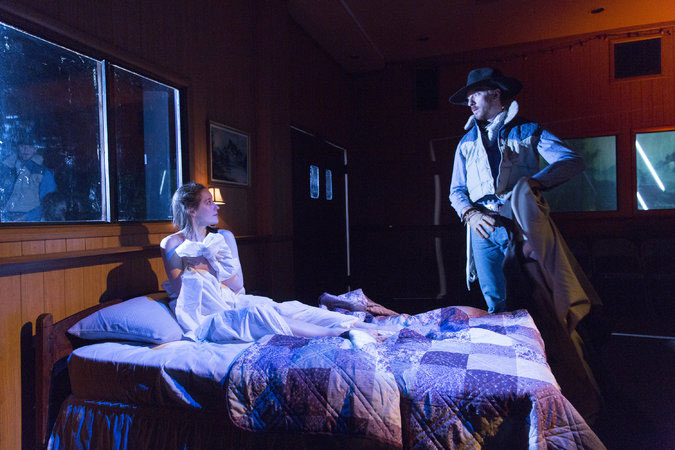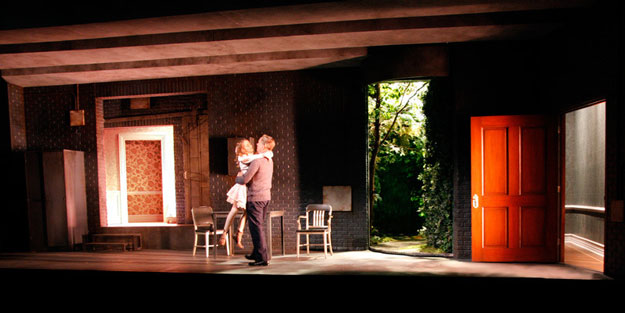
As we roll out the new year with a crop of new plays awaiting us, I’ve found myself thinking about some of the most memorable theatre experiences of 2015. Of all the exceptional work from the past year, two plays in particular stand out in my mind: Clare Barron’s You Got Older and Jennifer Haley’s The Nether. Not only are they exceptional pieces of writing that received knockout productions in New York, but they seem to hint at something greater about new plays in American theatre.
You Got Older deals with a daughter returning home to care for her cancer-stricken father (not to mention herself). It is an unflinchingly honest portrait of family, growing up, and the disorienting process of reassembling the pieces of one’s life; and it’s one of the most vulnerable and beautiful pieces of theatre I’ve ever encountered. And then we have The Nether, which takes a cerebral look at the future of the internet, where virtual realms help pedophiles and murders cope with their impulses by allowing them to live out their horrific fantasies in the “safe space” that is the Nether. It is a fiercely gripping story, and a fully realized imagination of the future that leaves the audience facing a powerful ethical quandary.
On the surface these plays could not appear to be more different, yet the imagination, desires, and empathy explored in each story connects them. Also pulling them together is director Anne Kauffman, who helmed both Off Broadway productions. We were thrilled to bring these three remarkable women together for a conversation about theatre, imagination, and more. Take a read below.
Ben Coleman, Samuel French’s Literary Supervisor: These two plays, You Got Older and The Nether seem to occupy two opposite ends of the spectrum, as far as new plays go I think – You Got Older with its bold homespun vulnerability, and The Nether with its unsettling vision into the future of the digital age. What compels you about these stories?
Clare Barron: I’m very interested in [Jen’s] play because it’s an ethical play, which is actually very rare. Ethical plays fascinate me because they really force you to live in a gray area for a long time, which is a really uncomfortable thing! Knowing right from wrong and when precisely a line is crossed and how close you can get to that line… It’s just way more complicated than I think human beings want it to be.
Jennifer Haley: And I think some people deal with that better than others. I think people who enjoy [The Nether] kind of like being in that state of discomfort, questioning, and curiosity. And people who do not like that want some kind of statement: “Well which do you believe – which position is right or wrong?”
Anne Kauffman: Living in the middle, yeah. You know for me that’s what the theatre does best: it forces us into the gray area. I don’t necessarily think theatre can change the world but I certainly think it’s a necessary part of our ecosystem, because, when it’s good, it asks the questions that we don’t have time to ask anymore. There is common ground in these two seemingly disparate plays; basically we’re talking about the imagination in both. The things we create and then end up haunting us. I’m thinking about the cowboy sex fantasies that proliferate the protagonist’s subconscious in You Got Older, and I would say that the imagination in The Nether is equally vital and dangerous: the virtual world of The Nether is not real, it’s nothing but imagination. The two plays examine the positive and negative aspects of imagination – its powers, both creative and destructive. And that’s compelling.
Ben: I think it is really interesting how plays today seem to ask the audience to use our imagination in deeper ways.
Anne: Yeah I definitely think we were reliant upon that in both productions. Because in The Nether we decided design-wise to never allow the stage to be fully taken over by the online world. We were always in the interrogation room with mere glimpses of the Nether, since the characters longed for that world but were ultimately trapped in the present and ‘reality.’ We hoped the audience would project the Victorian world of the Nether onto the interrogation room.
Anne (con’t): And certainly in You Got Older, there is a fluidity of space because we thought of the playing space as Mae’s [the protagonist’s] psychology. We’re in her head somehow and because memories tend to merge and emotional distress distorts, it seemed right to maintain a fluidity to express that, which meant that no furniture ever moved even though we were constantly shifting locations. Everything necessary was already onstage to reflect how space collides in memory and imagination.
Clare: I’m very interested in different mental landscape…You get to hear all of Mae’s reactions about everything. If she can’t shut down her “inappropriate” thoughts, how can she be there for someone else? How do you navigate that mental world? Not to mention the actual world…
Jen: When I was a child, I was living in my imagination. And I feel like theatre is where you create a virtual reality with a bunch of other people who are all playing pretend. So it feels like a natural progression. I even think of actors playing characters as people assuming avatars.
Anne: Something interesting about Mae’s cowboy in You Got Older and people becoming their avatars in The Nether, is how these fantasies bleed into our waking life. What’s the gateway from one world to another? And it’s our desire. You know? The gateway is our desire.
Clare: That was one of my favorite parts of our production. We talked about it like the world was melting, so the cowboy doesn’t leave, and then Mae sort of just walks into the kitchen across the stage, and the dad is opening the door from over there, and the light is spilling on her and the whole world changes around her…To me, it was such a beautiful representation of what it feels like when the world is swimming around you, and you want to be present with your loved ones and pay attention but your brain is actually thinking about other things. Sex or your work or whatever it is. It’s this mental swimming landscape.
Brooke Bloom and Michael Schantz in YOU GOT OLDER for Page 73 Productions at HERE. Photo Credit: Richard Termine.
Anne: Yeah, and I mean theatre is a place for metaphor. Right? At least film and television can’t do metaphor in a live way, with physical materials like theatre can. To actually experience something that’s metaphorical yet tangible, as you’re sitting in the audience… I think that’s the exciting thing about the theatre.
Ben: I’m struck by how these two plays ask the audience to empathize with the characters on stage.
Clare: I’m remembering seeing [The Nether] and there’s this character doubling that happens. At a certain point in the play you realize two characters are actually the same person. This happens in two instances. And my empathy exploded at that discovery. Maybe it’s because we didn’t realize just how vulnerable these characters were really being and that we were watching such an intimate part of their lives, but I felt very empathetically towards both those characters.
Jen: Well I think that’s what our theatre does, because we can’t really know someone else’s experience. We think we can, but I don’t think we really can, you know?
Anne: It’s interesting how empathy works in the two different plays too. Jen had to be very artful not to villainize the pedophiles in The Nether. To explore this issue in a way that was incredibly complex made that empathy so important. Empathy has to be The Nether’s engine, in a way. And in Clare’s You Got Older, it’s an entirely different kind of structure, or construction of empathy. I don’t think you’re [Clare] asking for people to empathize with Mae. There’s a negative arc that happens for Mae. She starts out okay, and then takes a nosedive all the way through the time when her dad essentially kicks her out, compelling her to return to, and face her life. It’s not until almost the very end, when she gets the phone call from her dad and he tells her his cancer is back that we feel empathy for her. That phone call is the moment when she “Got Older.” The way Mae deals with her dad in that moment – that’s the empathic moment for me. She braces herself and she becomes the adult she needs to be in that phone call with her dad, but simply, humanly, not heroically.
Sophia Anne Caruso and Frank Wood in THE NETHER. at MCC. Photo Credit and Scenic Design: Laura Jellinek.
Ben: I’m curious, what do you all observe in new plays nowadays? Are there any trends you notice, or topics the theatre world seems interested to explore?
Anne: Yeah, that’s a hard one. I’m noticing more plays dealing with some vision of the future, and these vision-of-the-future-plays are not necessarily “sci-fi.” I definitely feel like Lisa D’Amour’s Detroit is a vision of the future. Very much so.
Clare: I’ve been reading a lot of plays where people are interested in how personal you can get.
Jen: I’ve seen this trend too. Sometimes the playwright just puts themselves right in it.
Clare: I do that, yeah!
Ben: Does it feel dangerous to write such vulnerable material?
Clare: I think writing from personal experience always changes. There are like, three layers of translation: your actual experience, it coming out in language, and then when directors and actors add their bodies and energy. It’s fascinating. You can put the most personal thing down on paper and by the time you’re rehearsing, it feels totally removed.
Ben: Both shows provide great launching pads for post-theatre discussion. Possibly because you get to leave your audiences in this marvelous gray area, and send them out into the world.
Clare: I always want to write something that extends beyond that final moment. And I think (in very different ways) both plays leave you with a lot of personal reflection. The way the pedophilia in The Nether plays out in a virtual landscape leaves you with a truly difficult ethical issue attached to sexual desire. Jen brings you inside it just enough so that it’s impossible not to personally reflect. And sexual desire is just a very complex thing for every human being.
Jen: There is a sort of curtain in our sexuality that we are often afraid to peek behind. For me it’s impossible to see You Got Older and not have it also touch on some of those topics personally.
Clare: There is sex in both of the plays but there is also repression, like fighting with sex — trying to control your thoughts or feelings; like you shouldn’t be feeling a certain way.
Ben: Maybe these plays are more similar than I thought! We’re tying a lot of threads together here.
Jen: Yes! And well, both plays also leave you in intensely personally places.
Anne: That’s the thing about both of these plays; both endings totally kill you. Kill you.
Clare: My favorite plays that I’ve seen as an audience member are often the ones that linger with me; the weird strange plays that you want to talk about the next day. And maybe ask you to think about yourself more than the characters in the play.

Comedy Mysteries: Gasps, Laughs and Thrills

A Children’s Theatre Classic: An Interview with Snow White And The Seven Dwarfs Composer Michael Valenti



